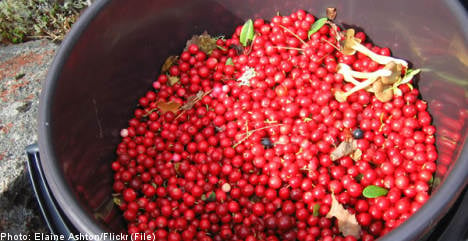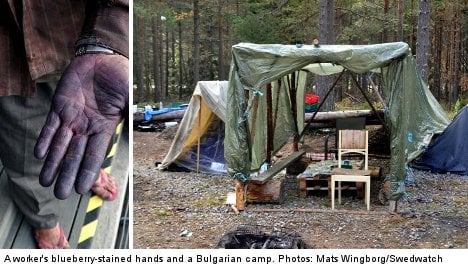“This morning we have picked up ten people who were walking south on the E4 motorway near Hagsta. They want to go home but they need help,” said Mikael Hedström of the local police to news agency TT.
According to police, some hundred berry pickers turned up in the village of Svabensverk between the counties of Hälsingland and Dalarna in northern Sweden, telling the villagers and later the police that they were dumped in the woods by a truck and now have nowhere to go.
Volunteers from the village are now helping to feed the berry pickers and many of them spent the night in the Svabensverk church hall.
“There are no berries here and they are hungry and tired, We have scrounged some food from nearby shops and I am about to cook them some lunch,” said Eva Gesslin, one of the village volunteers to TT.
The berry pickers were staying in a camp some ten kilometres from the village where an additional 300 people are said to reside.
“It is sad that the organization dumped them this way. There’s not much we can do but we will go out there later this afternoon to inform them what duties and rights they have,” said Yoomi Renström of the Ovanåker municipality to TT.
A meeting took place on Tuesday between the Bulgarian ambassador, the police, and the municipalities involved to discuss how to address the problems with the berry picker camps, belived to be caused partly by human trafficking.
“A 43-year-old man was remanded in custody yesterday (Monday) suspected of human trafficking,” Lisa Sannervik, a spokeswoman for police in the central
Swedish region of Uppsala, told news agency AFP.
Sannervik said the suspected human trafficker had “contacted Bulgarian berry pickers in their home country and promised to give them housing and food and salaries for picking berries in Sweden” – a tempting proposition after last year’s excellent berry harvest.
He had driven a bus-load of Bulgarian migrants up to central Sweden, but when they got there they were only handed tents and basically left to fend for themselves in what is shaping up to be a disastrous berry season, she said.
“The problem is that there have not been any berries at all,” said Sannervik to AFP.
Sannervik confirmed that the Bulgarian ambassador had travelled up to Söderhamn on the east coast to meet with local authorities and to attempt to solve the problem.
“The municipality, the police and the embassy must work together to find a decent solution to improve the situation for these people,” she said.
Lars Stål, of the municipality of Söderhamn, said that the meeting went well although they are yet far from reaching a solution.
“The embassy says that it is not their job to help these Bulgarians to get home, but neither is it the municipality’s duty – so the pickers are falling between chairs. What we have come to realize is that there is no miracle cure that is going to solve all the problems,” he told TT.
Stål told TT that all parties had gained a better understanding for the problems in general, which was a positive outcome.
“But really this is a conversation that needs to be held between the governments of the two countries and not in a meeting with Söderhamn municipality,” said Stål, adding that the issue needs to be discussed on an international level.
At present no one knows how many European berry pickers there are in the Swedish woods.
After the last week’s disastrous events, the Swedish government is planning a proposal to be presented this autumn with regards to foreign recruitment agencies in order to be able to better control the situation.
Hillevi Engström, the labour market minister, told TT that the situation the berry pickers are finding themselves in is “regrettable”.
”I think that the new rules will mean better transparency in the labour market and better possibilities for both authorities and unions to make sure that workers’ needs are met,” she said in an email to TT.
If the proposal is accepted it is hoped that the new rules will come into effect in 2013.



 Please whitelist us to continue reading.
Please whitelist us to continue reading.
Member comments